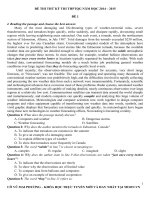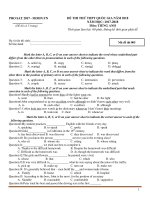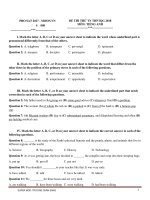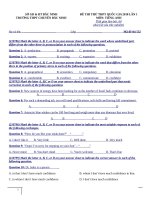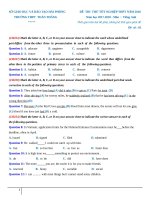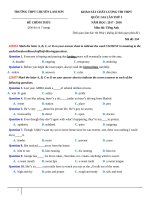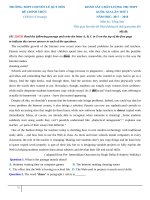12 đề thi thử tiếng anh năm 2018 – cô mai phương đề số (5)
Bạn đang xem bản rút gọn của tài liệu. Xem và tải ngay bản đầy đủ của tài liệu tại đây (503.02 KB, 17 trang )
ĐỀ THI THỬ TN THPTQG 2018
MÔN: TIẾNG ANH
---------------------***---------------------
PRO SAT 2017 - MOON.VN
E
Ð S 008
---------------------***---------------------
I. Mark the letter A, B, C or D on your answer sheet to indicate the word whose underlined part is
pronounced differently from that of the others.
Question 1: A. telephone
B. interpreter
C. perverted
D. restaurant
Question 2: A. measure
B. decision
C. permission
D. pleasure
II. Mark the letter A, B, C, or D on your answer sheet to indicate the word that differs from the
other three in the position of the primary stress in each of the following questions.
Question 3: A. religious
B. performance
C. miserable
D. including
Question 4: A. decoration
B. temperament
C. opportunity
D. expectation
III. Mark the letter A, B, C, or D on your answer sheet to indicate the underlined part that needs
correction in each of the following questions.
Question 5: My father used to (A) giving me (B) some good advice (C) whenever I had (D) a problem.
Question 6: The woman (A) of whom the red car (B) is parked in (C) front of the bank is (D) a famous pop
star.
Question 7: (A) Migrant workers (B) live in (C) substandard unsanitary, and dilapidated housing and often (D)
are lacking medical care.
IV. Mark the letter A, B, C, or D on your answer sheet to indicate the correct answer to each of the
following questions.
Question 8: _______ is the study of the Earth's physical features and the people, plants, and animals that live in
different regions of the world.
A. Science
B. Geography
C. History
D. Technology
Question 9: As it was getting late, the boys decided to _______ the campfire and crept into their sleeping bags.
A. put up
B. put off
C. put out
D. put on
Question 10: You shouldn't _________to your teacher like that. It was very rude.
A. have talked
B. talk
C. have be talked
D. talked
Question 11: We _________for three hours and are very tired.
A. are walking
B. have been walking C. were walking
SUPER MOD: TRƯƠNG CHẤN SANG
D. had been walking
1
Question 12: It is believed _________causes insomnia.
A. too much caffeine which
B. that too much caffeine
C. it in too much caffeine
D. too much caffeine that
Question 13: _______ non-verbal language is _______ important aspect of interpersonal communication.
A. θ/an
B. A/ the
C. the/θ
D. The/a
Question 14: This small town developed ______ I had expected.
A. not fast as
B. as much fast as
C. slowly than
D. much faster than
Question 15: Many people and organizations have been making every possible effort in order to save _______
species.
A. endangered
B. dangerous
C. fearful
D. threatening
Question 16: The man asked me _______ in English.
A. what does this word mean
B. what that word means
C. what did this word mean
D. what that word meant
Question 17: The student took that course ______ he could improve his English.
A. in order to
B. though
C. so that
D. unless
Question 18: An eyewitness described how ten people_____ in the fire.
A. had been killed
B. had killed
C. were killed
D. had been being
Question 19: No one died in the accident, ________?
A. didn‟t they
B. did he
C. didn‟t he
D. did they
Question 20: Janet: “Do you feel like going to the cinema this evening?” -Susan: "_______.”
A. You‟re welcome
B. That would be great
C. I feel very bored
D. I don't agree, I'm afraid
Question 21: - “ Can I use your motorbike this evening?” - “_________.”
A. Of course, you can
B. Of course, you might
C. It‟s my pleasure
D. Do it if you can
V. Mark the letter A, B, C, or D on your answer sheet to indicate the word(s) CLOSEST in
meaning to the underlined word(s) in each of the following questions.
Question 22: The teacher gave some suggestions on what could come out for the examination.
A. hints
B. symptoms
C. effects
D. demonstrations
Question 23: I‟ll take the new job whose salary is fantastic.
SUPER MOD: TRƯƠNG CHẤN SANG
2
A. wonderful
B. acceptable
C. pretty high
D. reasonable
VI. Mark the letter A, B, C, or D on your answer sheet to indicate the word(s) OPPOSITE in
meaning to the underlined word(s) in each of the following questions.
Question 24: We‟d better speed up if we want to get there in time.
A. slow down
B. turn down
C. put down
D. lie down
Question 25: The machine has been out of order since last month.
A. under repair
B. functioning well
C. sold out
D. refusing orders
VII. Mark the letter A, B, C, or D on your answer sheet to indicate the sentence that is closest in
meaning to each of the following questions.
Question 26: "Why don't you ask the teacher for help?" Peter asked me.
A. Peter advised me to ask the teacher for help.
B. Peter recommended me not to ask the teacher for help.
C. Peter told me the reason why I did not ask the teacher for help.
D. Peter suggested that he should ask the teacher for help.
Question 27: The Vietnamese students have to take an entrance exam ______.
A. in order that they should go to a college or university
B. for going to a college and university
C. so that they can go to a college or university
D. so as go to a college or university
Question 28: Without skillful surgery, he would not have survived the operation.
A. Had it been for skillful surgery he would not have survived the operation.
B. He wouldn't have survived the operation if he hadn't had skillful surgery.
C. But for skillful surgery he would not have survived the operation.
D. With skillful surgery he would have survived the operation.
VIII. Mark the letter A, B, C, or D on your answer sheet to indicate the sentence that best
combines each pair of sentences in the following questions.
Question 29: She received three letters this morning. All of them were from Tony
A. All of the letters from Tony were received by her this morning
B. She received three letters this morning, all of which were from Tony
SUPER MOD: TRƯƠNG CHẤN SANG
3
C. Three of the letters she received this morning were from Tony
D. All letters from Tony were received by her this morning
Question 30: He is very intelligent. He can solve all the problems in no time.
A. So intelligent is he that he can solve all the problems in no time.
B. He is very intelligent that he can solve all the problems in no time.
C. An intelligent student is he that he can solve all the problems in no time.
D. So intelligent a student is he that he can solve all the problems in no time.
IX. Read the following passage and mark the letter A, B, C, or D on your answer sheet to indicate
the correct word or phrase that best fits each of the numbered blanks from 31 to 35:
All relationships go through difficult times. In the past, when married couples had problems they usually didn‟t
(31) _________. They had to either (32) _________ with each other or continue to live together in an unhappy
relationship. Getting divorced wasn‟t an option for most people due to economic and social reasons. Some
people believe that this wasn‟t such a bad thing. They say that relationships require hard work and (33)
_________. “If a relationship is going to last a lifetime, you have to keep working at it,” says Doreen, who is
celebrating her fiftieth wedding anniversary this year. “It isn‟t all roses and romance. No one perfect all of the
time. These days young people give up when there‟s the (34) _________ argument.” Experts agree that
communication is key. The most important thing is to keep talking. How many times have you heard yourself
say to somebody, “If only you‟d listen!” or “I wish you wouldn‟t do that!” The truth is, the (35) ______ couples
talk, the better their relationship can be.
Question 31: A. grow up
B. split up
C. chat up
D. make up
Question 32: A. get on
B. go out
C. get back
D. fall out
Question 33: A. agreement
B. argument
C. achievement
D. commitment
Question 34:
B. slightest
C. most violent
D. most controversial
B. fewer
C. less
A. smallest
Question 35: A. more
D. least
X. Read the following passage and mark the letter A, B, C, or D on your answer sheet to indicate
the correct answer to each of the questions from 36 to 42:
A recent investigation by scientists at the U.S. Geological Survey shows that strange animal behavior might
help predict earthquakes. Investigators found such occurrences within a ten – kilometer radius of the epicenter
of a fairly recent quake. Some birds screeched and flew about wildly; dogs yelped and ran around
uncontrollably.
Scientists believed that animals can perceive environmental changes several hours or even days before the
mishap. Animals were noted as being restless for several weeks before a Tashkent, Uzbekistan, earthquake. An
hour before the disaster, domestic animals refused go to indoors, and dogs howled and barked furiously. In
1960, an earthquake struck Agadir in Morocco. Survivors recall that stray animals, including dogs, were seen
streaming out of town before the earthquake. In a safari zoo near San Francisco, llamas would not eat the
evening before a 1979 quake, and they ran around wildly all night.
SUPER MOD: TRƯƠNG CHẤN SANG
4
Unusual animal behavior preceding earthquakes has been noted for centuries. British Admiral Robert Fitzroy
reported huge flocks of screaming seabirds over Concepcion, Chile, in 1835. An hour and a half later, dogs
were seen fleeing, and ten minutes later the town was destroyed. Similar stories of chickens running around in
apparent states of panic, horses trembling, and dogs barking incessantly were recorded throughout the
eighteenth and nineteenth centuries by survivors of earthquakes destruction in India, Yugoslavia, Peru, Mexico,
and the United States.
In 1976, after monitoring bizarre animal behavior, the Chinese predicted a devastating earthquake. Although
hundreds of thousands of people were killed, the government was able to evacuate millions of other people and
thus keep the death toll at a lower level.
Question 36: What prediction may be made by observing animal behaviors?
A. An impending earthquake
B. The number of people who will die
C. The ten kilometer radius from the epicenter
D. The fact that an earthquake has occurred
Question 37: “devastating” means most nearly the same as
A. destructive
B. voracious
C. intense
D. forthcoming
Question 38: The author implies that animals are aware of an impending earthquake because
A. of their superior intelligence
B. they have certain instinctive abilities to perceive that humans do not possess
C. they are generally closer to epicenter than the human observers
D. they react to other animal behavior
Question 39: The word “epicenter” is nearest in meaning to
A. stratosphere
B. contour
C. periphery
D. core
Question 40: All of the following statements are true EXCEPT
A. some animals may be able to sense an approaching earthquake
B. by observing animal behavior scientists perhaps can predict earthquake
C. the Chinese have successfully predicted an earthquake and saved many lives
D. only dogs and horses seem to possess the special perception that allows them to predict earthquakes
Question 41: The passage implies that if scientists can accurately predict earthquakes, there will be
A. fewer animals going crazy
B. a lower death rate
C. fewer people evacuated
D. fewer environmental changes
Question 42: The word “evacuate” is closest in meaning to
SUPER MOD: TRƯƠNG CHẤN SANG
5
A. remove
B. exile
C. destroy
D. emaciate
XI. Read the following passage and mark the letter A, B, C, or D on your answer sheet to indicate
the correct answer to each of the questions from 43 to 50:
Noise is unwanted sound and is among the most pervasive pollutants today. Noise from road traffic, jet planes,
jet skis, garbage trucks, construction equipment, manufacturing processes, lawn mowers, leaf blowers, and
boom boxes, to name a few, are among the unwanted sounds that are routinely broadcast into the air.
The problem with noise is not only that it is unwanted, but also that it negatively affects human health and wellbeing. Problems related to noise include hearing loss, stress, high blood pressure, sleep loss, distraction and lost
productivity, and a general reduction in the quality of life and opportunities for tranquility.
We experience noise in a number of ways. On some occasions, we can be both the cause and the victim of
noise, such as when we are operating noisy appliances or equipment. There are also instances when we
experience noise generated by others just as people experience second-hand smoke. While in both instances,
noises are equally damaging, second-hand noise is more troubling because it has negative impacts on us but is
put into the environment by others, without our consent.
The air into which second-hand noise is emitted and on which it travels is a “commons”, a public good. It
belongs to no one person or group, but to everyone. People, businesses, and organizations, therefore, do not
have unlimited rights to broadcast noise as they please, as if the effects of noise were limited only to their
private property. On the contrary, they have an obligation to use the commons in ways that are compatible with
or do not detract from other uses.
People, businesses, and organizations that disregard the obligation to not interfere with others' use and
enjoyment of the commons by producing noise pollution are, in many ways, acting like a bully in a school yard.
Although perhaps unknowingly, they nevertheless disregard the rights of others and claim for themselves rights
that are not theirs.
We have organized to raise awareness of noise pollution and help communities take back the commons from
those acting like bullies. Our efforts include building a library of resources and tools concerning noise pollution,
establishing links to other groups that have similar collections, establishing networks among local noise
activists, assisting communities and activists who are working to reduce noise pollution, and monitoring and
advocating for stronger noise controls.
Question 43: It is stated in the passage that all of the following are things the noise comes from EXCEPT
______.
A. Television, radio
B. Lawn mower, leaf blowers
C. Road traffic, garbage trucks
D. Jet planes, watercraft
Question 44: It can be inferred from the passage that the effects of noise pollution on the human body are that
_____.
A. people get accustomed to ear and heart diseases
B. people focus mainly on hearing
C. people have difficulty falling asleep
SUPER MOD: TRƯƠNG CHẤN SANG
6
D. people are sensitive about everything around them
Question 45: Which of the following is supposed to be way to reduce noise pollution?
A. cooperation with other noise activists
B. fining people who break laws in noise regulation
C. construction of large projects along roads
D. prohibiting public transport during peak hours
Question 46: The word “it” in paragraph 4 refers to ______.
A. the air
B. a public good
C. effect of noise
D. second-hand noise
Question 47: It is mentioned in the passage that when we are operating noisy appliances or we experience
noise generated by others ______.
A. The noise is so troublesome if we make it or not.
B. We feel more comfortable if we don‟t experience second-hand noise.
C. The noise have a strong influence on us, but not on others.
D. We just ignore the serious detriment if the noise is put into the environment by others.
Question 48: The word “disregard” in paragraph 5 could be best replaced by which of the following?
A. ignore
B. obey
C. invade
D. disturb
Question 49: Which of the following is NOT true according to the passage?
A. Noise that is experienced by people who did not produce it is called second-hand noise.
B. People‟s enjoyment of the commons by producing noise pollution is regarded as a bully.
C. Noise is one of the most common contaminants nowadays.
D. People intentionally make noise when they work.
Question 50: Which of the following best describes the author‟s tone in the passage?
A. Incentive
B. Explanatory
C. Cynical
D. Provocative
------------------THE END--------------------
SUPER MOD: TRƯƠNG CHẤN SANG
7
HƯỚNG DẪN GIẢI CHI TẾT
1. D
11. B
21. A
31. B
41. D
2. C
12. B
22. A
32. A
42. A
3. C
13. A
23. A
33. D
43. A
4. B
14. D
24. A
34. B
44. C
5. A
15. A
25. B
35. A
45. A
6. A
16. D
26. A
36. A
46. A
7. D
17. C
27. B
37. A
47. A
8. B
18. A
28. C
38. B
48. A
9. C
19. B
29. B
39. D
49. D
10. A
20. B
30. A
40. D
50. B
1)
D
A.
telephone /ˈtelɪfəʊn/
B.
interpreter /ɪnˈtɜːprɪtə(r)/
C.
perverted /pəˈvɜːtɪd/
D.
restaurant /ˈrestrɒnt/
=> Câu D phát âm là /e/, còn lại phát âm là /ɪ/
2)
C
A.
measure /ˈmeʒə(r)/
B.
decision /dɪˈsɪʒn/
C.
permission /pəˈmɪʃn/
D.
pleasure /ˈpleʒə(r)/
=> Câu C phát âm là /ʃ/, còn lại phát âm là /ʒ/.
3)
C
A.
religious /rɪˈlɪdʒəs/
B.
performance /pəˈfɔːməns/
C.
miserable /ˈmɪzrəbl/
D.
including /ɪnˈkluːdɪŋ/
=> Câu C trọng âm 1, còn lại trọng âm 2.
4)
B
A.
decoration /ˌdekəˈreɪʃn/
B.
temperament /ˈtemprəmənt/
C.
opportunity /ˌɒpəˈtjuːnəti/
D.
expectation /ˌekspekˈteɪʃn/
=> Câu B trọng âm 1, còn lại trọng âm 3.
5)
A
Câu này dịch như sau: Bố tôi từng thường cho tôi những lời khuyên hay mỗi khi tôi gặp rắc rối.
Giving => give vì cấu trúc này cộng với động từ nguyên mẫu.
Cấu trúc: Used to + V : Thói quen trong quá khứ.
6)
A
Câu này dịch như sau: Người phụ nữ có chiếc xe hơi đỏ được đậu đằng trước ngân hàng là một ca sĩ nhạc pop
nổi tiếng.
SUPER MOD: TRƯƠNG CHẤN SANG
8
Of whom => whose hoặc of who vì đây là đại từ quan hệ nêu lên tính sở hữu cái gì.
7)
D
Câu này dịch như sau: Công nhân di cư sống ở khu nhà xiêu vẹo bẩn thỉu hạ cấp và thường thiếu sự chăm sóc y
tế.
Are lacking => lack vì liên từ „and‟ nối 2 mệnh đề cùng thì. Sửa từ hiện tại hoàn thành sang hiện tại đơn vì đây
thể hiện 1 thực trạng thường xuyên.
8)
B
A.
Khoa học
B.
Địa lí
C.
Lịch sử
D.
Công nghệ
Câu này dịch như sau: Địa lí là môn ngành nghiên cứu những sự vật vật lí trên Trái Đất và con người, cây cối,
động vật sống ở những khu vực khác nhau trên Thế Giới.
9)
C
A.
Xây dựng, đề cử
B.
Trì hoãn, cởi (quần áo)
C.
Dập tắt
D.
Mặc vào, thêm vào
Câu này dịch là: Vì đã muộn rồi, những cậu con trai quyết định tắt lửa trại và chui vào túi ngủ của chúng.
10)
A
Câu này dịch như sau: Lẽ ra bạn không nên nói với giáo viên như thế. Nó rất thô lỗ.
Cấu trúc should/shouldn‟t have + V3 diễn tả một hành động lẽ ra nên làm trong quá khứ nhưng đã không làm.
11)
B
Câu này dịch như sau: Chúng ta đã đi bộ được 3 tiếng đồng hồ rồi và chúng ta rất mệt.
Thì hiện tại hoàn thành tiếp diễn nhấn mạnh một hành động xảy ra trong quá khứ và kéo dài đến hiện tại.
Cấu trúc: S + have/has + been + V-ing.
12)
B
Câu này dịch như sau: Người ta tin rằng quá nhiều caffeine gây chứng mất ngủ.
Cấu trúc: It is believed (that) + mệnh đề.
13)
A
Câu này dịch như sau: Ngôn ngữ phi ngôn từ là một lĩnh vực quan trọng trong giao tiếp giữa cá nhân.
Với non-verbal language không có mạo từ vì đây là một tập hợp rộng lớn, duy nhất, không dùng mạo từ.
Với important aspect dùng mạo từ không xác định vì đây là một danh từ chung bổ nghĩa cho chủ ngữ.
14)
D
Câu này dịch như sau: Thành phố nhỏ này phát triển nhanh hơn nhiều so với tôi mong đợi.
Cấu trúc so sánh hơn: S + V + (much) + tính từ so sánh hơn + than + S2.
15)
A
SUPER MOD: TRƯƠNG CHẤN SANG
9
A.
Có nguy cơ tuyệt chủng
B.
Nguy hiểm
C.
Sợ hãi
D.
Đe dọa
Câu này dịch như sau: Nhiều người và tổ chức đang cố gắng mọi thứ có thể để cứu những giống loài có nguy cơ
bị tuyệt chủng.
16)
D
Câu này dịch như sau: Người đàn ông đã hỏi tôi từ đó trong tiếng Anh có nghĩa là gì.
Trong câu tường thuật, mệnh đề đằng sau lùi thì theo động từ chính phía trước. Và trong câu khẳng định không
sử dụng đảo ngữ.
17)
C
Câu này dịch như sau: Cậu học sinh đã tham gia khóa học đó để anh ta có thể cải thiện khả năng tiếng Anh của
anh ta.
Mệnh đề trước và mệnh đề sau mang nghĩa tương đồng => nối nhau bằng so that.
18)
A
Câu này dịch như sau: Một nhân chứng diễn tả 10 người đã bị giết chết trong đám cháy như thế nào.
Câu tường thuật thì mệnh đề tường thuật phải lùi thì theo mệnh đề phía trước. Hành động này xảy ra trước hành
động tường thuật => hành động ở mệnh đề sau lùi về thì quá khứ hoàn thành. ĐỘng từ kill phải chia ở bị động
=> had been killed.
19)
B
Câu này dịch như sau: Không ai chết trong tai nạn hết phải ko?
Câu hỏi đuôi có thì ngược với mệnh đề phía trước, mệnh đề phía trước tuy là khẳng định nhưng có no one mang
tính phủ định và là số ít => did he.
20)
B
A.
Không có gì
B.
Sẽ rất tuyệt vời đấy
C.
Tôi cảm thấy rất chán
D.
TÔi không đồng ý, tôi e là vậy
Câu này dịch như sau: “Bạn có cảm thấy thích đi xem phim tối nay không? – sẽ rất tuyệt vời đấy.”
Để đồng ý một lời đề nghị => that would be great là phù hợp nhất.
21)
A
A.
Tất nhiên là bạn có thể
B.
Tất nhiên là bạn đã có thể
C.
Đó là hân hạnh của tôi
D.
Làm đi nếu bạn có thể
Câu này dịch như sau: “Tôi có thể dùng xe bạn tối nay không?” “Dĩ nhiên bạn có thể”
Câu hỏi đảo ngữ là can you => trả lời là you can.
Of course you can là cách trả lời phù hợp nhất trong các đáp án.
SUPER MOD: TRƯƠNG CHẤN SANG
10
22)
A
Câu này dịch như sau: Giáo viên cho chúng tôi một vài gợi ý về đề thi có thể ra gì.
A.
Gợi ý
B.
Triệu chứng
C.
Ảnh hưởng
D.
Trình bày
Suggestions = hints: gợi ý.
23)
A
Câu này dịch như sau: Tôi sẽ nhận công việc mới có mức lương tuyệt vời.
A.
Tuyệt vời
B.
Chấp nhận được
C.
Khá cao
D.
Hợp lí
Fantastic = wonderful : tuyệt vời.
24)
A
Câu này dịch như sau: Chúng ta tốt hơn là nên tăng tốc nếu muốn đến đó kịp giờ.
A.
Chậm lại
B.
Tắt đi
C.
Đặt xuống
D.
Nằm xuống
Speed up >< Slow down: Chậm lại
25)
B
Câu này dịch như sau: Cái máy đã hỏng từ tháng trước.
A.
Trong giai đoạn sửa chữa
B.
Hoạt động tốt
C.
Bán hết hàng
D.
Từ chối đặt hàng
Out of order >< Functioning well: hoạt động tốt
26)
A
Câu này dịch như sau: “Tại sao bạn không nhờ giáo viên giúp đỡ?” Peter đã hỏi tôi.
A.
Peter khuyên tôi nên nhờ giáo viên giúp đỡ.
B.
Peter dặn tôi đừng nhờ giáo viên giúp đỡ.
C.
Peter nói với tôi lí do tại sao tôi đã không nhờ giáo viên giúp đỡ.
D.
Peter đề nghị rằng anh ấy nên hỏi giáo viên giúp đỡ.
E.
B
27)
B
Câu này dịch như sau: Học sinh Việt Nam phải làm một bài thi đầu vào ______.
A.
B.
để cho họ nên vào đại học hoặc cao đẳng
cho việc vào cao đẳng hoặc đại học
SUPER MOD: TRƯƠNG CHẤN SANG
11
C.
cho nên là họ có thể vào đại học hoặc cao đẳng
D.
để vào cao đẳng học đại học => loại vì “so as to go”
28)
C
Câu này dịch như sau: Nếu không nhờ kĩ năng phẫu thuật tốt (của bác sĩ), anh ấy lẽ ra đã không thể sống sót
qua ca phẫu thuật.
A.
Nếu có kĩ năng phẫu thuật tốt (của bác sĩ), anh ấy lẽ ra đã không thể sống sót qua ca phẫu thuật.
B.
Anh ấy lẽ ra đã không thể sống sót qua ca phẫu thuật nếu anh ấy không có kĩ năng phẫu thuật tốt.
C.
Nếu không nhờ kĩ năng phẫu thuật tốt (của bác sĩ), anh ấy lẽ ra đã không thể sống sót qua ca phẫu thuật.
D.
Với kĩ năng phẫu thuật tốt (của bác sĩ), anh ấy lẽ ra đã sống sót qua ca phẫu thuật.
29)
B
Câu này dịch như sau: Cô ấy đã nhận được 3 lá thư sáng nay. Tất cả chúng đều là từ Tony.
A.
Tất cả các lá thư từ Tony đều được cô ấy nhận vào sáng nay.
B.
Cô ấy nhận 3 lá thư sáng nay, tất cả chúng là từ Tony.
C.
Ba trong số các lá thư cô ấy nhận được sáng nay là từ Tony.
D.
Tất cả lá thư từ Tony được cô ấy nhận sáng nay => thiếu thông tin số lượng thư.
30)
A
Câu này dịch như sau: Anh ấy rất thông minh. Anh ấy có thể giải quyết mọi vấn đề ngay tức khắc.
A.
Anh ấy thông minh đến nỗi có thể giải quyết mọi vấn đề ngay lập tức.
B.
Anh ấy rất thông minh đến nỗi có thể giải quyết mọi vấn đề ngay lập tức. => sai cấu trúc. (dùng so …
that….)
C.
Một học sinh thông minh là anh ấy nên anh ấy có thể giải quyết mọi vấn đề ngay lập tức => sai ngữ
pháp.
D.
Anh ấy là một học sinh thông minh đến nỗi anh có thể giải quyết mọi vấn đề ngay lập tức. => sai cấu
trúc.
Cấu trúc : So + adj + be + S + that clause So + adv + auxiliary verb + S + main verb + O + that clause. Mẫu câu
đảo ngữ so…that để mô tả hiện tượng, hay sự việc ở một mức độ tính chất mà có thể gây nên hậu quả, kêt quả
tương ứng.
31)
B
A.
grow up: trưởng thành
B.
split up: chia rẽ, li thân
C.
chat up: nói chuyện thẳng thắn
D.
make up: trang điểm/dựng chuyện.
In the past, when married couples had problems they usually didn‟t (31) _________.
=> Ngày xưa, khi các cặp đôi cưới nhau có mâu thuẫn họ thường không chia tay nhau.
32)
A
A.
Get on with: hòa hợp với
B.
Go out: đi chơi
C.
Get back: quay lại
D.
Fall out: rơi ra/cãi nhau bất hòa
They had to either (32) _________ with each other or continue to live together in an unhappy relationship.
=> Họ phải hòa hợp với nhau hoặc tiếp tục một cuộc sống trong mối quan hệ không hạnh phúc.
33)
D
SUPER MOD: TRƯƠNG CHẤN SANG
12
A.
Agreement: sự đồng ý
B.
Argument: sự tranh cãi
C.
Achievement: thành tựu
D.
Commitment: sự ràng buộc, nhượng bộ lẫn nhau.
They say that relationships require hard work and (33) _________.
=> Người ta nói rằng các mối quan hệ đòi hỏi sự nỗ lực và sự ràng buộc, nhượng bộ lẫn nhau.
34)
B
A.
Smallest: kích thước nhỏ nhất
B.
Slightest: nhẹ nhàng nhất
C.
Most violent: hung bạo nhất
D.
Most controversial: gây tranh cãi nhất
No one perfect all of the time. These days young people give up when there‟s the (34) _________ argument.
=> Không có ai hoàn hảo hoàn toàn. Ngày nay người trẻ thường bỏ cuộc khi có cuộc cãi vã nhẹ nhàng nhất.
35)
A
A.
More: nhiều hơn
B.
Fewer: ít hơn ( đếm được)
C.
Less: ít hơn (ko đếm được)
D.
Least: ít nhất
The truth is, the (35) ______ couples talk, the better their relationship can be.
=> Sự thật là, các cặp đôi giao tiếp càng nhiều, mối quan hệ càng trở nên tốt đẹp.
Đoạn trước tác giả nói “communication is key” nên phải là „more‟ thì mới đúng chứ không phải less.
36)
A
Bằng cách quan sát hành vi của động vật có thể đưa ra dự đoán nào?
A.
Một trận động đất sắp đến
B.
Số người sẽ chết
C.
Bán kính 10 km từ tâm chấn
D.
Một trận động đất đã xảy ra.
A recent investigation by scientists at the U.S. Geological Survey shows that strange animal behavior might
help predict earthquakes.
=> Một nghiên cứu mới đây bởi các nhà khoa học tại Thống kê Địa chất Mỹ cho thấy rằng những hành vi lạ của
động vật có thể giúp dự đoán được động đất.
=> An impending earthquake.
37)
A
“devastating” có nghĩa gần giống với:
A.
Tính phá hủy
B.
Tham ăn, ngấu nghiến
C.
Dữ dội
D.
Sắp đến
In 1976, after monitoring bizarre animal behavior, the Chinese predicted a devastating earthquake.
SUPER MOD: TRƯƠNG CHẤN SANG
13
=> Năm 1976, sau khi ghi nhận lại những hành động lạ của động vật, người Trung Quốc đã dự đoán một trận
động đất hủy diệt.
=> devasting = destructive (tính phá hủy)
38)
B
Tác giả ngụ ý rằng động vật có thể nhận thức được một trận động đất sắp đến vì:
A.
Trí tuệ vượt trội của chúng
B.
Chúng có những bản năng nhất định mà con người không có để phát hiện ra được.
C.
Chúng thường gần tâm chất hơn những người quan sát.
D.
Chúng phản ứng lại hành vi của những động vật khác.
Scientists believed that animals can perceive environmental changes several hours or even days before the
mishap.
=> Các nhà khoa học tin rằng động vật có thể nhận biết được những thay đổi môi trường trước nhiều giờ hay
thậm chí nhiều ngày trước sự kiện đó.
39)
D
A.
Tầng bình lưu
B.
Đường viền
C.
Chu vi
D.
Điểm trung tâm
Investigators found such occurrences within a ten – kilometer radius of the epicenter of a fairly recent quake.
=> Các nhà khảo sát phát hiện ra những sự cố đó diễn ra trong vòng bán kính 10 km tính từ tâm chấn của một
cơn động đất gần đây.
=> epicenter = core (Điểm trung tâm)
40)
D
Những nhận định sau đây là đúng ngoại trừ:
A.
Một số loài động vật có khả năng cảm nhận được động đất sắp đến.
B.
Bằng cách quan sát hành động của động vật các nhà khoa học của thể dự đoán được động đất.
C.
Người Trung Quốc đã dự đoán thành công động đất và cứu mạng rất nhiều người.
D.
Chỉ có chó và ngựa dường như có khả năng nhận biết đặc biệt cho phép chúng dự đoán động đất.
Similar stories of chickens running around in apparent states of panic, horses trembling, and dogs barking
incessantly were recorded throughout the eighteenth and nineteenth centuries by survivors of earthquakes
destruction in India, Yugoslavia, Peru, Mexico, and the United States.
=> Tương tự câu chuyện gà chạy loạn xạ trong trạng thái hoảng loạn, ngựa run rẩy và chó sủa liên tục được ghi
lại trong suốt thế kỉ 18 và 19 bởi những người sống sót sau các trận động đất tại Ấn Độ, Yugoslivia, Peru,
Mexico và Mỹ. => D sai.
41)
D
Bài viết ngụ ý là nếu các nhà khoa học có thể dự đoán chính xác động đất, đó sẽ là
A.
B.
C.
Ít động vật nổi điên hơn
Tỉ lệ người chết thấp
Ít người phải sơ tán hơn
SUPER MOD: TRƯƠNG CHẤN SANG
14
D.
Ít thay đổi môi trường hơn
Although hundreds of thousands of people were killed, the government was able to evacuate millions of other
people and thus keep the death toll at a lower level.
=> Mặc dù hàng trăm nghìn người đã chết, chính phủ đã có khả năng sơ tán hàng triệu người khác và nhờ đó
giữ tỉ lệ người chết ở mức thấp.
42)
A
Từ „evacuate‟ mang nghĩa gần nhất với:
A.
Dời đi, chuyển đi
B.
Đày ải
C.
Phá hủy
D.
Làm hao mòn
Although hundreds of thousands of people were killed, the government was able to evacuate millions of other
people and thus keep the death toll at a lower level.
=> Mặc dù hàng trăm nghìn người đã chết, chính phủ đã có khả năng sơ tán hàng triệu người khác và nhờ đó
giữ tỉ lệ người chết ở mức thấp.
=> evacuate = remove
43)
A
Đoạn văn nói rằng tất cả những điều sau sản sinh ra tiếng ồn:
A.
TV, radio
B.
Máy cắt cỏ, máy thổi lá
C.
Phương tiện trên đường, xe chở rác
D.
Động cơ máy bay, xuồng máy
Noise from road traffic, jet planes, jet skis, garbage trucks, construction equipment, manufacturing processes,
lawn mowers, leaf blowers, and boom boxes, to name a few, are among the unwanted sounds that are routinely
broadcast into the air.
=> Tiếng ồn từ phương tiện trên đường, động cơ máy bay, động cơ xuồng máy, xe chở rác, thiết bị xây dựng,
quá trình sản xuất, máy cắt cỏ, máy thổi lá, máy nghe nhạc cỡ lớn, để kể ra một vài tên, là nhiều trong số những
âm thanh hằng ngày truyền vào không khí.
44)
C
Có thể suy ra được từ bài viết rằng các ảnh hưởng của ô nhiễm tiếng ồn lên cơ thể con người là:
A.
Mọi người quen với vấn đề về tai và tim.
B.
Mọi người tập trung chủ yếu vào việc nghe
C.
Mọi người khó khăn trong việc đi vào giấc ngủ.
D.
Mọi người rất nhạy cảm về mọi thứ xung quanh họ.
Problems related to noise include hearing loss, stress, high blood pressure, sleep loss, distraction and lost
productivity, and a general reduction in the quality of life and opportunities for tranquility.
=> Vấn đề liên quan đến tiếng ồn bao gồm giảm thính lực, căng thẳng, huyết áp cao, mất ngủ, mất tập trung,
mất năng suất làm việc và nhìn chung giảm chất lượng cuộc sống và cơ hội cho sự yên tĩnh.
45)
A
SUPER MOD: TRƯƠNG CHẤN SANG
15
Điều nào trong những điều sau đâu nên là cách để giảm ô nhiễm tiếng ồn?
A.
Hợp tác với những nhà hoạt động chống ô nhiễm âm thanh khác.
B.
Phạt những người phá vỡ luật về âm thanh bình thường.
C.
Xây dựng một dự án lớn khắp con đường.
D.
Cấm phương tiện giao thông công cộng trong giờ cao điểm.
Our efforts include building a library of resources and tools concerning noise pollution, establishing links to
other groups that have similar collections, establishing networks among local noise activists, assisting
communities and activists who are working to reduce noise pollution, and monitoring and advocating for
stronger noise controls.
=> Nỗ lực của chúng tôi bao gồm xây dựng một thư viện của các nguồn và công cụ liên quan đến ô nhiễm tiếng
ồn, xây dựng liên kết với nhóm khác có cùng bộ sưu tập, thiết lập mạng lưới giữa những nhà hoạt động chống ô
nhiễm tiếng ồn khác, hợp tác với cộng đồng và nhà hoạt động đang làm việc để giảm ô nhiễm âm thanh, ghi
nhận và ủng hộ sự kiểm soát âm thanh tốt hơn.
46)
A
Từ „it‟ ở đoạn 4 liên quan đến.
A.
Không khí
B.
Phương tiện công cộng
C.
Ảnh hưởng của âm thanh
D.
Âm thanh thụ động.
It belongs to no one person or group, but to everyone.
=> Không khí thuộc về không riêng người nào hay nhóm nào, mà thuộc về mọi người.
47)
A
Bài viết nhắc tới khi chúng ta vận hành thiết bị gây tiếng ồn nhiều hoặc chúng ta chịu đựng âm thanh tạo ra bởi
người khác:
A.
Âm thanh gây hại kể cả khi chúng ta tạo ra hay không
B.
Chúng ta cảm thấy thoải mái hơn nếu chúng ta không chịu đựng âm thanh thụ động.
C.
Âm thanh có ảnh hưởng mạnh mẽ lên chúng ta, không phải lên người khác.
D.
Chúng ta lờ đi những tổn hại nếu âm thanh được đưa vào môi trường bởi người khác.
While in both instances, noises are equally damaging, …
=> Trong cả 2 trường hợp (Thụ động và chủ động), âm thanh gây ra sự tổn hại ngang nhau,…
48)
A
Từ „disregard‟ở đoạn 4 có thể thay thế tốt nhất bởi từ nào sau đây?
A.
Lờ đi
B.
Tôn trọng
C.
Xâm hại
D.
Làm phiền
People, businesses, and organizations that disregard the obligation to not interfere with others' use and
enjoyment of the commons by producing noise pollution are, in many ways, acting like a bully in a school yard.
SUPER MOD: TRƯƠNG CHẤN SANG
16
=> Mọi người, doanh nghiệp, tổ chức mà lờ đi sự bắt buộc không được làm ảnh hưởng đến hoạt động của người
khác và sự thư giãn của mọi người bằng cách tạo ra những tiếng ồn âm thanh, theo nhiều cách, đang cư xử như
những tên bắt nạt ở sân trường học.
=> disregard = ignore (lờ đi).
49)
D
Những câu nào sau đây không đúng theo bài viết?
A.
Tiếng ồn mà người chịu đựng không tạo ra nó được gọi là tiếng ồn thụ động.
B.
Sự thư giãn của mọi người bằng việc tạo ra tiếng ồn được xem là những người băt nạt.
C.
Tiếng ồn là một trong những thứ gây ô nhiễm thường thấy nhất ngày nay.
D.
Mọi người cố ý tạo ra tiếng ồn khi họ làm việc.
Noise is unwanted sound and is among the most pervasive pollutants today.
=> Tiếng ồn là âm thanh không mong muốn và một trong những thứ gây ô nhiễm ngày nay => D sai
50)
B
Tính từ nào sau đây diễn tả tốt nhất giọng văn của tác giả?
A.
B.
C.
D.
Khích lệ
Giải thích
Chỉ trích cay độc
Khiêu khích
SUPER MOD: TRƯƠNG CHẤN SANG
17
